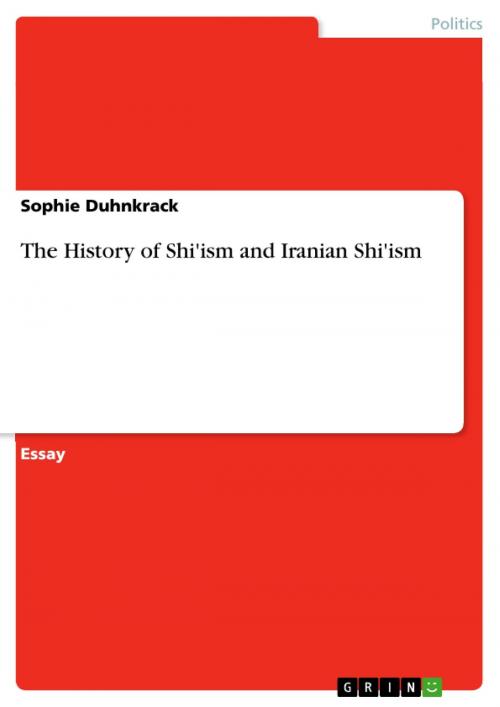The History of Shi'ism and Iranian Shi'ism
Nonfiction, Social & Cultural Studies, Political Science, International, International Relations| Author: | Sophie Duhnkrack | ISBN: | 9783640517046 |
| Publisher: | GRIN Publishing | Publication: | January 22, 2010 |
| Imprint: | GRIN Publishing | Language: | English |
| Author: | Sophie Duhnkrack |
| ISBN: | 9783640517046 |
| Publisher: | GRIN Publishing |
| Publication: | January 22, 2010 |
| Imprint: | GRIN Publishing |
| Language: | English |
Essay from the year 2009 in the subject Politics - International Politics - Region: Near East, Near Orient, grade: 85, Ben Gurion University, course: Iran , language: English, abstract: Ervand Abrahamian introduces his work Khomeinism: Essays on the Islamic Republic with a discussion of two terms interesting for an analysis of the Islamic Revolution, particularly considering Western images of Khomeini and his movement: fundamentalism and populism. These ideologically loaded concepts depict the book's central thesis, namely that fundamentalism is not an appropriate term for describing Khomeini, his ideas and movement. According to Abrahamian, it alludes 'religious inflexibility, ... political traditionalism, ... social conservatism, the centrality of scriptural-doctrinal principles, [and] ... the rejection of the modern world.' He instead presents populism as a more apposite term, which 'connotes attempts made by nation-states to enter that world.' The scholars Daniele Albertazzi and Duncam McDonnell define 'populism' in a widely accepted definition as an ideology which pits a virtuous and homogeneous people against a set of elites and dangerous 'others' who are together depicted as depriving (or attempting to deprive) the sovereign people of their rights, values, prosperity, identity and voice. Essentially approving of Abrahamian's cited thesis, this essay attempts to illustrate that the Islamic Revolution, led by Ayatollah Khomeini, does not represent a movement driven by 'religious fundamentalism' or 'fanaticism,' but the Iranian way of emancipation from domestic and foreign oppression and domination, materialized by the Shah and the West. This thesis will be developed through exploring the Shi'ite history and especially its appearance in Iran. Furthermore it will continually explore the religion's revolutionary and supposedly fanatical characteristics and its contribution to the 1979 revolution, which, as its leader Khomeini, Western mainstream media often denounce as fundamentalist and radical.
Essay from the year 2009 in the subject Politics - International Politics - Region: Near East, Near Orient, grade: 85, Ben Gurion University, course: Iran , language: English, abstract: Ervand Abrahamian introduces his work Khomeinism: Essays on the Islamic Republic with a discussion of two terms interesting for an analysis of the Islamic Revolution, particularly considering Western images of Khomeini and his movement: fundamentalism and populism. These ideologically loaded concepts depict the book's central thesis, namely that fundamentalism is not an appropriate term for describing Khomeini, his ideas and movement. According to Abrahamian, it alludes 'religious inflexibility, ... political traditionalism, ... social conservatism, the centrality of scriptural-doctrinal principles, [and] ... the rejection of the modern world.' He instead presents populism as a more apposite term, which 'connotes attempts made by nation-states to enter that world.' The scholars Daniele Albertazzi and Duncam McDonnell define 'populism' in a widely accepted definition as an ideology which pits a virtuous and homogeneous people against a set of elites and dangerous 'others' who are together depicted as depriving (or attempting to deprive) the sovereign people of their rights, values, prosperity, identity and voice. Essentially approving of Abrahamian's cited thesis, this essay attempts to illustrate that the Islamic Revolution, led by Ayatollah Khomeini, does not represent a movement driven by 'religious fundamentalism' or 'fanaticism,' but the Iranian way of emancipation from domestic and foreign oppression and domination, materialized by the Shah and the West. This thesis will be developed through exploring the Shi'ite history and especially its appearance in Iran. Furthermore it will continually explore the religion's revolutionary and supposedly fanatical characteristics and its contribution to the 1979 revolution, which, as its leader Khomeini, Western mainstream media often denounce as fundamentalist and radical.















